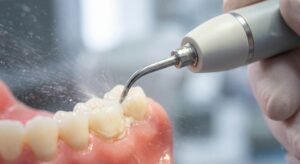When blood sugar becomes the enemy of your mouth
Diabetes is like an unwelcome guest that affects every corner of the body—and the mouth is no exception. In Mexico, where 14% of adults live with diabetes understanding this connection is vital. “Many patients come to the clinic with inflamed gums or recurring infections, without realizing that diabetes is at the center of the problem,”explains a specialized dentist. Here’s everything you need to know to protect your smile, even if diabetes is part of your life.
1. The science behind diabetes and oral problems 🔬
Why does diabetes damage teeth and gums?
- High glucose = happy bacteria:Excess sugar in saliva feeds the bacteria that form dental plaque.
- Weak blood vessels:Hyperglycemia damages the capillaries that nourish gums and teeth, reducing their ability to heal.
- Compromised immune systemAccording to UNAM, people with diabetes are 3 times more likely to develop severe periodontitis.
The vicious cycle 🔄
- Uncontrolled diabetes → gum inflammation.
- Inflamed gums → release of substances that increase insulin resistance.
- Greater insulin resistance → worse glucose control.
Shocking fact:A study by the National Institute of Cardiology revealed that treating periodontitis in people with diabetes can reduce HbA1c by 0.4% (equivalent to some medications).
2. Warning signs: What your mouth is trying to tell you 🚨

Early symptoms (Act now!)
- 📌 Red or shiny gums: As if they were “swollen.”
- 📌 Bleeding when biting hard foods:Apples, toast.
- 📌 Constant bad taste in the mouth:Similar to metal or bitterness.
Signs that the situation is serious
- 📌 Teeth that move:As if they were “loose.”
- 📌 Recurrent abscesses:Small pus bumps on the gums.
- 📌 Dentures that no longer fit:Due to bone loss.
Real case:: “Juan, 58 years old, came in with an abscess that wouldn’t heal. When reviewing his history, we discovered that his diabetes was uncontrolled (HbA1c of 9%). After coordinating with his endocrinologist and treating the infection, we not only saved his tooth… his daily energy improved too!”
3. The ABCs of oral care for people with diabetes 📚

A. Hygiene that goes beyond brushing
- Modified Bass technique::
- Place the brush at a 45° angle against the gum.
- Use short, gentle movements (vibration, not friction).
- Use an electric toothbrush with a pressure sensor if you have hand neuropathy.
- Special dental floss:With expandable silk to avoid injuring sensitive gums.
- Alcohol-free mouthwash:Better with ingredients like 0.12% chlorhexidine (only under prescription) or xilitol xylitol for hydration.
B. Nutrition: Your secret ally
| Foods that protect | Foods that harm |
|---|---|
| Hard cheeses (stimulate saliva) | Packaged juices (acidic + sugar) |
| Crunchy vegetables (celery, carrot) | Sticky cookies |
| Water with lemon (no sugar) | Alcohol (dries the mouth) |
Pro-Tip : “Cinnamon tea helps control glucose… but drink it without sugar and brush afterwards!”
C. Coordination between professionals
- Before any dental treatment::
- Share your latest HbA1c test.
- Inform about medications (e.g., insulin, metformin).
- Ask them to contact your endocrinologist if appointment times need adjustment.
4. Safe dental treatments for people with diabetes 🛡️
Technology that makes the difference
- Dental laser:To treat gums without excessive bleeding.
- Implants with nanostructured surfaces: Support osseointegration even with altered metabolism.
- Anesthetics without vasoconstrictors:Reduce risks in patients with vascular damage.
Procedures requiring extra caution
- Extractions:Only with glucose <180 mg/dL and preventive antibiotics.
- Periodontal surgeries:Better during early morning hours.
- Whitening:Avoid if you have diabetic retinopathy (some whitening agents affect blood vessels).
Ideal protocol:
- Glucose measurement at the clinic.
- Short appointments (max 30 min to reduce stress).
- Use of healing dressings with type I collagen.
5. Myths vs. realities: Debunking dangerous beliefs 💥

| Myth | Reality |
|---|---|
| “People with diabetes can’t use braces” | False. Orthodontics is safe with strict glucose control. |
| “Removable dentures are the better option” | It depends.Implants are preferable if there’s good bone density. |
| “Diabetes inevitably causes tooth loss” | No! With proper care, you can keep your natural teeth.. |
6. Success stories: When care makes the difference 🌟
Case 1: From despair to a confident smile
“Laura, 45, came in afraid of losing her teeth. After 6 months of deep cleanings, medication adjustments, and personalized hygiene techniques, we not only stopped her periodontitis… she regained the confidence to smile in public!”
Case 2: Implants that changed a life
“Carlos, 62 with type 2 diabetes, received 3 implants with computer-guided technology. Today he eats without pain, and his HbA1c dropped from 8.5% to 7.1% thanks to improved nutrition.”
Your smile doesn’t have to be a victim of diabetes 💪
With knowledge, technology, and consistent habits, it’s possible to maintain a healthy mouth even with diabetes. Remember:
- Check your gums the same way you check your glucose.
- Your dentistis your ally, not your enemy.
- Small daily changes create big long-term results.
“Diabetes may be a challenge, but it’s never a life sentence. Your smile is worth it… and so are you!”





